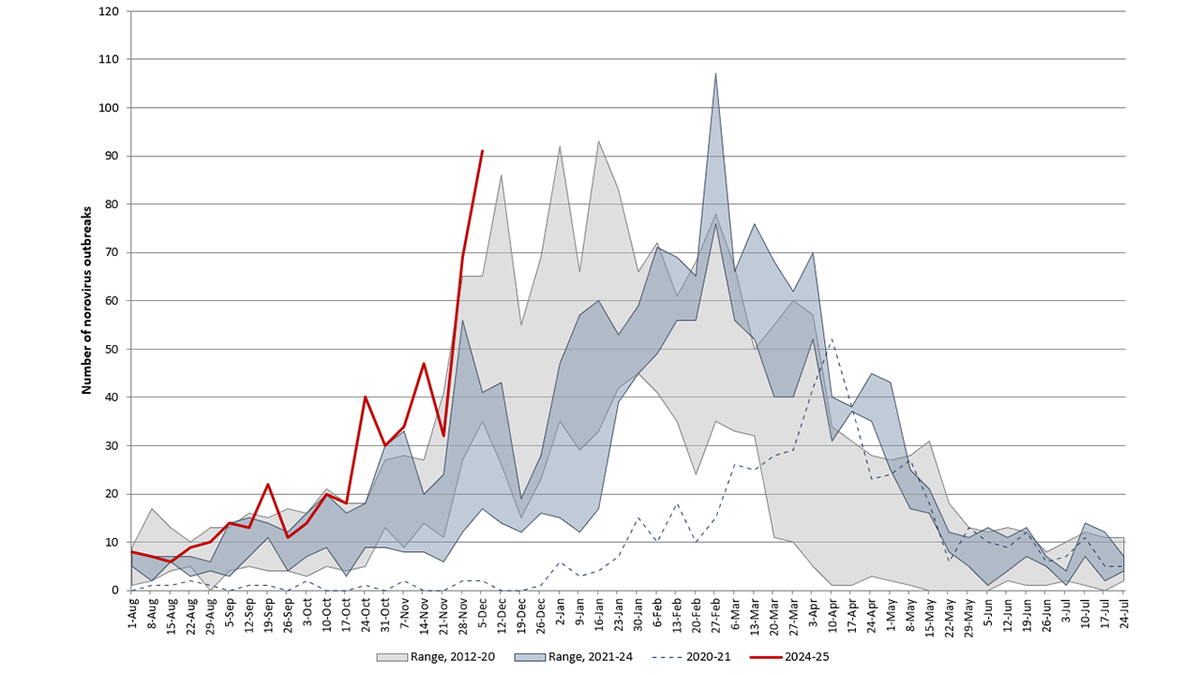

Cases of norovirus, also known as food poisoning or the stomach bug, have picked up steam across the U.S.
The number of suspected or confirmed outbreaks skyrocketed at the end of 2024, with more than 91 norovirus outbreaks reported by state health departments by the first week of December, according to data from the Centers for Disease Control and Prevention (CDC).
Norovirus typically shows up with an onset of uncomfortable symptoms, including nausea, vomiting, diarrhea and stomach pain. In some cases, it can cause fever, headache and body aches.
CASES OF NOROVIRUS OR STOMACH FLU CLIMB STEADILY ACROSS US: ‘THIS IS THE SEASON FOR IT’
Chad D. Neilsen, MPH, director of Infection Prevention and Control at Nemours Children's Health in Florida, shared with Fox News Digital that norovirus is the leading cause of foodborne illnesses in the U.S., causing about 20 million cases each year.

Norovirus is responsible for about 109,000 hospitalizations and 900 deaths each year in the U.S., mostly affecting adults over 65 years old, according to the National Foundation for Infectious Diseases (NFID).
About one in 15 Americans will get norovirus annually, and one out of 160 children will be hospitalized.
People of any age can be infected and can show symptoms within two days, Neilsen noted.
"Norovirus is extremely contagious, and is usually transmitted between people via close contact, but often via surfaces, utensils or foods that are contaminated with the virus," the doctor warned.
Fox News senior medical contributor Dr. Marc Siegel also weighed in, telling Fox News Digital that norovirus spreads "easily through food and food handling."

"It is wildly contagious and hard to defend against except by frequent handwashing, identifying symptoms early (vomiting, diarrhea, low-grade fever), and isolating yourself if sick," he said.
"There is no treatment except to stay well-hydrated," the doctor added. "[It] generally lasts around three days."
IS IT SAFE TO EAT EGGS AMID BIRD FLU OUTBREAKS?
Neilsen agreed that most people will recover from norovirus in one to three days without any treatment, but others could experience more severe symptoms like dehydration, which "could require medical attention."

Symptoms of dehydration include decreased urination, dry mouth and throat, dizziness when standing, crying with few or no tears, and unusual sleepiness or fuzziness, according to the CDC.
If norovirus strikes, the agency recommends drinking plenty of liquids to prevent dehydration and to seek medical care if it becomes severe.
Steps to avoid norovirus are similar to preventing any other foodborne illness, Neilsen shared.
For more Health articles, visit foxnews.com/health
"Wash your hands, thoroughly cook your food at the recommended temperatures, properly clean and disinfect surfaces, and avoid contact with others if sick," he advised.
The CDC also recommends washing fruits and vegetables thoroughly and washing laundry in hot water, if possible.

The doctor reiterated how cases in the U.S. have been rising since 2023, but there is no clear research into the reasons why.
Norovirus typically peaks between November and April, according to Neilsen, most likely due to "seasonality trends" that are similar to other contagious viruses thriving during this time, like the flu.
TO SIGN UP FOR OUR HEALTH NEWSLETTER
"The combination of indoor spaces, close contact and crowding is why norovirus thrives in environments like schools, daycares and cruise ships," he said.

"Once an outbreak starts, it’s challenging to control it without public health and sanitation expertise."
Norovirus can be difficult to kill, Neilsen noted. He recommends using bleach to clean contaminated surfaces.
Some people may still be contagious after recovery. Experts recommend proceeding with caution and continuing disinfection routines.


